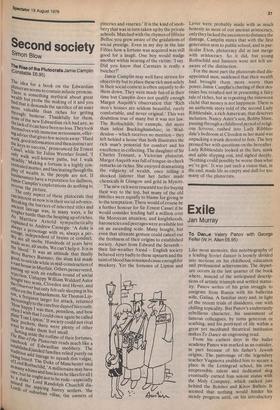Second society
Simon Blow
The Rise of the Plutocrats Jamie Camplin (Constable £6.95) The idea for a book on the Edwardian plutocrats seems to contain infinite promise. There is something mythical about great wealth but probe the making of it and you find that it demands the sacrifice of an asset more valuable than riches for getting through: humour. Thankfully for them, none of the new Edwardian rich had any, so the lackof it can have been no loss. They took themselves with immense seriousness, offering advice that gives few secrets away: 'Hard work, good information and then instinct are the keys to success,' pronounced Sir Ernest Cassel, while Sir Julius Wernher found, 'I °nIY walk well-known paths, but I walk steadily. Making a fortune is a highly concentrated matter, and fascinating though the Play of wealth is, the people are not. If businessmen have a reputation for dullness, Jamie Camplin's explorations do nothing to reverse the picture. The Only aspect of these plutocrats that Can interest us now is in their social advance. Breaking the barriers of inherited titles and ancient lineage was, in many ways, a far tougher battle than the heaping up of riches. As Matthew Arnold sympathetically explained to Andrew Carnegie: 'A duke is always a personage with us, always a per-,,nage, independent of brains or conduct. ''Ire are all snobs. Hundreds of years have made us so, all snobs. We can't help it. It is in the blood.' It was an attitude that finally drove Barney Bamato, the slum kid made Bood, to suicide while in mid-construction of a vast house in Mayfair. Others perservered, Pre,11,tting UP with an endless round of social b-Jection. Unhappy William Waldorf Astor .,ought two seats, Cliveden and Hever, and _ln.e Observer but only felt safe sleeping in his ", 'flee on the Embankment. Sir Thomas LipLori, a frequent target for attack, returned 4Icreasing1y to the carefree days of hi syouth : 'How h
ofte ap r-v I was then, penniless, and how n I wish that I could once again be called k om Lipton.' If society could not rival Ways pockets, there were plenty of other ways to make them feel small. _Setting aside the outline of their fortunes, el he Rise of the Plutocrat reads much like a easest book of Edwardian snobbery. The ahlishedllanded families relied purely on tra.dition and lineage to squash this vulgar, t_ts„_ing breed. The Duke of Manchester said ians Lord Rothschild, 'A millionaire may have e_ttiallY whims and fancies as he likes for all I t.,'Eue; but he ought not to be rude -especially Li. a duke.' Lord Randolph Churchill dis
ssed the aspiring Surrey settlers, 'the Lords of suburban villas, the owners of pineries and vineries.' It is the kind of snobbery that was in turn taken up by the private schools. Matched with the rhymes of Hilaire Belloc you grew aware of the gradations of social prestige. Even in my day in the late Fifties how a fortune was acquired was still good for a laugh. One boy would nudge another within hearing of the victim: 'I say. Did you know that Carstairs is really a butcher?'
Jamie Camplin may well have striven for objectivity but to place these rich men solely in their social context is often unjustly to do them down. They were made fun of in their time but Camplin does not qualify enough Margot Asquith's observation that 'Rich men's houses are seldom beautiful, rarely comfortable, and never original.' This was doubtless true of many but it was not law. The Rothschilds, for example, did more than infest Buckinghamshire; in Waddesdon which receives no mention they left behind a house that both illustrates the rich man's potential for comfort and his excellence in collecting. The daughter of Sir Charles Tennant, a Victorian plutocrat, Margot Asquith was full of tongue-in-cheek remarks on riches. She enjoyed dramatising the vulgarity of wealth, once telling a shocked listener that her father made chemicals in Glasgow and gold in Mysore.
The new rich were resented too for buying their way to the top, but many of the old families were equally to blame for giving in to the temptation. There would of course be a further honour for Sir Ernest Cassel if he would consider lending half a million over the Moroccan situation; and knighthoods, baronetcies and peerages were available too on an ascending scale. Many bought, but even that ultimate gesture could cancel out the freshness of their origins to established society. Apart from Edward the Seventh their fair-weather friend English society behaved very badly to these upstarts and the taint of blood has remained cause enough for mockery. Yet the fortunes of Lipton and Lever were probably made with as much honesty as most of our ancient aristocracy, only they lacked the ancestors to distance the damage. Camplin states that with the first generation sent to public school, and in particular Eton, plutocracy did at last merge with aristocracy. So it did, but young Rothschild and Sassoon were not left unaware of the distinction.
For the most part the plutocrats died disappointed men, saddened that their wealth had brought them more worry than power. Jamie Camplin's charting of their destinies has resulted not in presenting a fairy tale of riches, but in repeating the timeworn cliché that money is not happiness. There is an authentic story told of the second Lady Ribblesdale, a rich American, that deserves inclusion. Nancy Astor's son, Bobby Shaw, passing through a childhood period of religious fervour, rushed into Lady Ribblesdale's bedroom at Cliveden as her maid was unpacking a trunk devoted to furs. The boy pressed her with questions on the hereafter. Lady Ribblesdale looked at the furs, mink and sable slipping out, and sighed deeply, 'Nothing could possibly be worse than what we've got.' It was just such a vision that, in the end, made life so empty and dull for too many of the plutocrats.


































 Previous page
Previous page